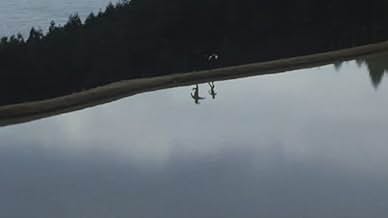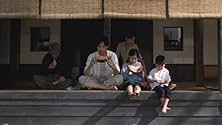IMDb RATING
7.5/10
8.2K
YOUR RATING
A young woman's husband apparently commits suicide without warning or reason, leaving behind his wife and infant.A young woman's husband apparently commits suicide without warning or reason, leaving behind his wife and infant.A young woman's husband apparently commits suicide without warning or reason, leaving behind his wife and infant.
- Director
- Writers
- Stars
- Awards
- 9 wins & 1 nomination total
- Director
- Writers
- All cast & crew
- Production, box office & more at IMDbPro
7.58.2K
1
2
3
4
5
6
7
8
9
10
Featured reviews
A Directing Triumph
Rarely do I rate films so highly, but Maborosi earned it's nine. A large part of my enjoyment of the film was due to the beautiful and subtle directing that seemed to compliment the story itself perfectly. Koreeda is a very promising Japanese director. I recommend this one to all serious movie watchers, and I await his future films.
Plot and pacing unlike Hollywood's formula
And beautiful and fascinating film with a gentle lyric quality. Runs directly counter to the usual Hollywood expectations. The most emotionally packed scene is filmed in extreme longshot! You can't even see the faces of the actors but the location and the action that you can see are enough. If you want to see a standard hollywood formula, then stay away. If you like quiet and moving films shot in entirely new ways (granted the director owes much to Ozu) then get this film.
drift through life, beautifully
A slow paced film that lets you have some empathy for a life changed by inexplicable loss, diverted to unexpected place and contemplation. Despite the intensity possible in the theme, the behavior is a compelling mixture of detachment and continuation of everyday activity, while underneath you can see the memories are unresolved. Some nice acting, especially if you can attune yourself to subtleties of normal life and are not expecting "larger than life" displays. The photography is beautiful and alternates with the acting in setting the mood and being the focus of attention.
I watched the US DVD version, which has somewhat disappointing video quality. You can see the director took some spectacular imagery which I have got to hope came out better on film, because on the DVD the resolution is muddy at times and some of the color is flat. It is just a bit better than VHS. A real pity they could not make a better digital transfer of such a visual artwork. Most of the soundtrack is voices and background environment which fits perfectly with the film, there is one sequence with (very effective) music soundtrack.
I watched the US DVD version, which has somewhat disappointing video quality. You can see the director took some spectacular imagery which I have got to hope came out better on film, because on the DVD the resolution is muddy at times and some of the color is flat. It is just a bit better than VHS. A real pity they could not make a better digital transfer of such a visual artwork. Most of the soundtrack is voices and background environment which fits perfectly with the film, there is one sequence with (very effective) music soundtrack.
Full, full, full of painterly light
Steeped in the traditions of the lush visual beauties of Japanese cinema, and influenced by the likes of Taiwanese (?) director Hsiao Hsien Hou (I believe there are several fairly direct quotes) or the luminous cinematography of Bergman's long time cameraman, Sven Nykvist. This film directly mines the visual effects of some of the most glorious European painters of light like Vermeer, Caravaggio, and Georges de la Tour. From the subtitles it seems that MABOROSI means 'strange light' and Kore eda uses almost nothing but strange, rich luminosity to tell his story (although he also gets a fine, somber perfomance from his female lead). Each shot is deeply thought out and composed to the maximum. Literally, every single shot. The results are tranquil and beautiful. The story is as quiet as the light, and probably if you require your film to have a strong direct narrative you should stay away from this as the story is told very subtly using light and almost subliminal sound (it seemed to me there were ocean waves in the sub background even in the city shots, for example). It works great as cinema. I would suggest that you watch at least the first 20 minutes or so again, after watching the whole film. The same motifs cross and criss cross all through the film and it really builds a wonderful texture.
I would recommend this as a double bill with something like the Actor's Revenge by Ichikawa- also deeply steeped in lush visual beauties and light. Or else Angel Dust by Sogo Ishii-a very opposite film full of passion, madness and violence, but where you see that meticulous, relentless search for supercomposition on almost a frame for frame basis. Or lastly, the tranquil, and beautiful, and very painterly Why Has Bodhidharma Left For The East- a Korean film by Bae Yong Kyun and something of a successful Zen meditation. Well one more, Mystery of Rampo-by Kazuyoshi Okuyama- very offbeat with bewitchingly lush visual beauty. (Rampo is Japanese for Edgar Allen Poe and the first Japanese mystery writer adopted Rampo as his nom de plume)
I would recommend this as a double bill with something like the Actor's Revenge by Ichikawa- also deeply steeped in lush visual beauties and light. Or else Angel Dust by Sogo Ishii-a very opposite film full of passion, madness and violence, but where you see that meticulous, relentless search for supercomposition on almost a frame for frame basis. Or lastly, the tranquil, and beautiful, and very painterly Why Has Bodhidharma Left For The East- a Korean film by Bae Yong Kyun and something of a successful Zen meditation. Well one more, Mystery of Rampo-by Kazuyoshi Okuyama- very offbeat with bewitchingly lush visual beauty. (Rampo is Japanese for Edgar Allen Poe and the first Japanese mystery writer adopted Rampo as his nom de plume)
Rethinking the art of the camera
I was fortunate to see Maborosi on a large screen at the Joslyn Art Museum. The venue was appropriate, for this film stands as one of the great achievements of the cinema. Indeed, I will go out on a long limb and argue that it deserves comparison to Carl Theodor Dreyer's Passion of St. Joan of Arc. Light, shadow, angle: in my experience these two films apply the most basic elements of cinematography in a most remarkable and brilliant fashion.
Maborosi opens with an astonishing shot, as the viewer looks up from one end of an arching bridge to see a young child following an old woman. The shot is meticulously framed by light posts, giving the impression of a picture on canvas. The camera remains still while the two actors proceed through the scene. The director's brilliant eye for placing everything "just right" immediately catches one's attention. It is a virtuoso shot; and then one's amazement grows as scene after scene continues with no drop off in the careful, artful composition of each image. After awhile, the viewer may become conscious of the camera: it does not move. As each scene commences, the activity occurs within a new, steady frame. I think that the camera moves during a scene only three times in the film, and then only in side-to-side pans. However, I was so enthralled with the film I may easily have overlooked some motion.
The story, concerning a young women's travail in overcoming the grief of her suicided husband, plays out quietly and slowly. The actors speak sparingly, and emotions are primarily portrayed through facial and bodily expression. The impact is large and plumbs depths. If a film like this were made in Hollywood--an utterly absurd idea--I'm sure the characters would be babbling on at each other. Maborosi explores the virtues of silence, patience, and careful attention: behaviors which are not widely cultivated in contemporary cinema, or in contemporary society for that matter.
Maborosi is a film to captivate those who want to see cinema which strives to be more than mere entertainment. It is in every sense an "art film," but in my mind it stands as one of those very rare films which emphasize the artful without a hint of the self-conscious and annoying artsy. A monumental achievement.
Maborosi opens with an astonishing shot, as the viewer looks up from one end of an arching bridge to see a young child following an old woman. The shot is meticulously framed by light posts, giving the impression of a picture on canvas. The camera remains still while the two actors proceed through the scene. The director's brilliant eye for placing everything "just right" immediately catches one's attention. It is a virtuoso shot; and then one's amazement grows as scene after scene continues with no drop off in the careful, artful composition of each image. After awhile, the viewer may become conscious of the camera: it does not move. As each scene commences, the activity occurs within a new, steady frame. I think that the camera moves during a scene only three times in the film, and then only in side-to-side pans. However, I was so enthralled with the film I may easily have overlooked some motion.
The story, concerning a young women's travail in overcoming the grief of her suicided husband, plays out quietly and slowly. The actors speak sparingly, and emotions are primarily portrayed through facial and bodily expression. The impact is large and plumbs depths. If a film like this were made in Hollywood--an utterly absurd idea--I'm sure the characters would be babbling on at each other. Maborosi explores the virtues of silence, patience, and careful attention: behaviors which are not widely cultivated in contemporary cinema, or in contemporary society for that matter.
Maborosi is a film to captivate those who want to see cinema which strives to be more than mere entertainment. It is in every sense an "art film," but in my mind it stands as one of those very rare films which emphasize the artful without a hint of the self-conscious and annoying artsy. A monumental achievement.
Did you know
- TriviaHirokazu Koreeda's directorial film debut.
- How long is Maborosi?Powered by Alexa
Details
Box office
- Gross worldwide
- $144,025
Contribute to this page
Suggest an edit or add missing content

























